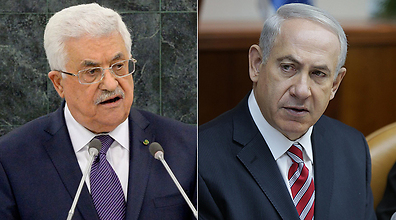
Palestinian threat to dissolve PA could have serious repercussions
Analysis: Should Palestinian self-rule end, hundreds of Palestinians would lose their job, and Israel would have to enter the vacuum created as a result, offering Palestinians security, education and welfare services at a cost Israel cannot afford.
The Palestinian threat to dissolve their self-rule and merge with the State of Israel has been thrown around for some time. Last Thursday night it landed full-force on the desk of the Israeli Prime Minister Benajmin Netanyahu.
The Palestinians are drawing the last card they have to play: Dismantling the Palestinian Authority and negating all of their accomplishments and all of the obligations they have taken upon themselves by the Oslo Accords. Suicide is on our doorstep.
The threat is a last-ditch effort to break the stagnation of peace talks, and force Netanyahu to make decisions that he has refused to accept until today.
The Palestinians remember what Ehud Barak once said about Netanyahu: "He only takes action when he feels a knife pushed up against his throat."
If the Palestinians actualize their threat there will be dramatic consequences. On the Palestinian side, the PA will collapse and all security administration will disperse, resulting in 40 thousand people losing their paychecks.
The IDF will have to find a way to fill the shoes of the PA by creating or acting as a police force, providing education, health, water, and sanitation services to the Palestinians.
The European Union and the US who currently support the PA with upwards of $2 billion yearly, will cut donations and Israel will have to make up the difference, but that will only be a fraction of the true costs required.
Careful calculations estimate that the first year of occupation of the territory will cost the State tens of billions of shekels. It's not easy to support 2.5 million people with no real industry or economic sectors.
The economic cost is the easy part. Collapse of the peace talks will likely lead to a new wave of violence led by Hamas, which will try to fill the vacuum created by the PA, while Israel will be forced to stand before a new international and legal situation.
Every house that will be built in eastern Jerusalem and the West Bank will be considered illegal according to the fourth Geneva Conventions.
Extensive boycotts against Israel can be expected and every Israeli official, minister or general, serving or retired, would be vulnerable to arrest at every airport in the West.
This is an extreme scenario. Several lighter scenarios could come to pass instead. Unfortunately, except for a few statements made by Tzipi Livni, no one in the government has bothered to tell the public what price they are likely to pay if the situation explodes.
The results are a suppression of the reality. Netanyahu's coalition is full of these types of suppressions. One of them is Orit Strook, a Knesset member from the right-wing Bayit Yehudi.
On her Facebook she happily promotes the destruction of the PA. "It will be much cheaper and much easier for Israel without the PA," she writes. Netanyahu better hope so.
(UPDATE: Bayit Yeudai Chairman Bennett has also welcomed the collapse of the PA.)
Timing is critical: the central council of the PLO is set to meet in Ramallah next Saturday evening. The PA's potential plan to dissolve is on the discussion's agenda.
Three days after the end of the nine month timeframe for peace talks that the Americans appropriated. An Israeli source involved in the talks described Abbas as "desperate" and "determined".
A separate source described him as a man less busy with peace talks and more concerned with the legacy he will leave behind.
It is not coincidence that in an interview released Saturday by the Egyptian daily newspaper Al-Masry Al-Youm, Abbas spoke about being 79-years-old, saying that it was time to pass leadership to Palestinians younger than himself. Even that was a type of threat.
Contrary to the impression given by negotiators, the question of releasing prisoners with Israeli citizenship isn't the only road block currently preventing the extension of the peace talks.
There are two much more important Palestinian demands which, like the prisoners, are unacceptable (for Israel) under any circumstance: A three month freeze on settlement building and a commitment by Israel to begin discussions on final border arraignments.
Sources in Israel suggest that Abbas would be willing to live with curbed construction - a freeze on private building, but building permits for public institutions of a certain scale would go through.
The Palestinians are making it difficult to trust this assessment. In any case Netanyahu was only ready to promise a freeze in settlement building.
The despair and anger in the Palestinian leadership stems from the disappointment of the failure in the current round of talks. In a meeting with an Israeli source, one of the heads of a Palestinian security branch said: "We are tired of being your South Lebanon Army."
He also said that "twenty odd years after the Oslo Accords and we understand now that you never had any intention of abiding by it. You're making demands that contradict the spirit of the agreement - recognition of Israel as a Jewish State, leaving IDF troops in the Jordan Valley, expanding settlement blocs and more."











